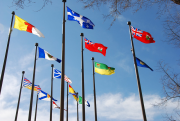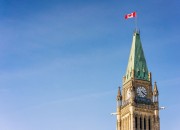While Calgary celebrates its resilience at a “Hell or High Water” Stampede, Toronto is drying out after a dramatic storm that saw more rain fall in two hours than the city usually sees in the entire month of July.
Even if you don’t live in Southern Alberta or Mississauga, floods are fodder for dinner table conversations across the country right now. And more and more Canadians are asking whether what we’re seeing is climate change.
Meteorologists are attributing yesterday’s storm in Toronto to a slow-moving thunderstorm system. But as Environment Canada’s David Phillips put it, “Nature was giving us a preview of what we may soon see” from global warming.
 In other words, this is what climate change looks like in real life. It means cities at a standstill, the hassle of dealing with insurance claims, the loss of treasured mementos in flooded basements — and in worst-case scenarios like we saw in High River, the tragic loss of life.
In other words, this is what climate change looks like in real life. It means cities at a standstill, the hassle of dealing with insurance claims, the loss of treasured mementos in flooded basements — and in worst-case scenarios like we saw in High River, the tragic loss of life.
Even when there are clear warnings of the risks, as we saw before Alberta’s floods, experts usually hesitate to link specific events to climate change, because it’s just one factor among many shaping the weather we experience and our vulnerability to it.
That’s true, and it’s absolutely fair — but in a growing number of cases, climate change is playing an important role. The best way I’ve seen it explained is that greenhouse gases put weather on steroids. You can’t say that steroids caused baseball legend Barry Bonds to hit a particular home run, but they definitely increased his odds.
This is what climate change looks like: cities at a standstill, the hassle of insurance claims, flooded basements — and in worst-case scenarios, the tragic loss of life.This is particularly clear with extreme downpours like those seen recently in Alberta and Ontario. A warmer atmosphere holds more moisture, so more rain can fall in any given storm.
In a new report released last week, the World Meteorological Organization showed what the consequences of our greenhouse gas pollution look like on a global scale. The organization found that:
- The decade from 2001 to 2010 “was the warmest decade on record since modern meteorological records began around the year 1850.” Hence the report’s subtitle, “a decade of climate extremes;”
- Canada experienced the greatest warming in the North and Central American region, warming at nearly three times the global average. We’ve also just experienced our country’s warmest decade on record;
- Floods were the most “frequently experienced extreme climate event” over the past decade; and
- While scientists “believe that it is not yet possible to attribute individual extremes to climate change, they increasingly conclude that many recent events would have occurred in a different way — or would not have occurred at all — in the absence of climate change.”
 That’s exactly what many of Canada’s climate scientists have been saying. Experts like Gordon McBean and John Pomeroy (not to mention David Keith, Jim Bruce, Danny Harvey, Dave Sauchyn, John Stone and many others) have been doing fantastic work to help us connect the dots between the weather we’re seeing and the fossil fuels we’re burning.
That’s exactly what many of Canada’s climate scientists have been saying. Experts like Gordon McBean and John Pomeroy (not to mention David Keith, Jim Bruce, Danny Harvey, Dave Sauchyn, John Stone and many others) have been doing fantastic work to help us connect the dots between the weather we’re seeing and the fossil fuels we’re burning.
I’m not a scientist; my work at Pembina is about sustainable energy policy. But climate change is the main motivation for the work my colleagues and I are doing. And what makes reports like the WMO’s so scary to me is that the experts conclude we don’t yet have the policies in place to contain the impacts of climate change or to prepare for its effects. So the consequences we’re seeing today are the first smoker’s coughs as we continue a two-pack-a-day cigarette habit.
Recently, it hasn’t been particularly trendy to talk about climate change in Canada. (In the House of Commons, our government has been far more likely to talk about its dislike of carbon taxes than about the reason we might need one.) We’re sometimes told that reducing greenhouse gas pollution is too costly, or that busy Canadians don’t want the potential inconvenience of making greener choices.

But if you’ve shovelled mud out of a basement lately — as many of my friends in Alberta have — you might have a whole new perspective on whether taking action on climate change is too much of a hassle. And the costs of reducing greenhouse gas pollution pale in comparison to what Albertans are facing as they rebuild homes from the ground up.
So as David Phillips said, we can take this summer’s storms as a preview — but let’s hope they convince us that we really don’t want to watch the full-length disaster movie.








